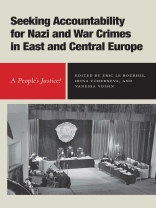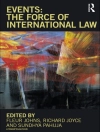The thirst for post-World War II justice transcended the Cold War and mobilized diverse social groups. This is a story of their multilayered and at times conflictual interactions.
In this edited collection, sixteen historians develop a new approach to the trials against persons accused of war crimes and mass murder in Europe during the ascendancy of Nazism and the Second World War (1933-1945). Focusing on the social aspects of the demand for justice and making use of previously underexploited local and international sources, contributors put to the test the notion of ‘show trials’ and explore a range of judicial and political cultures from Germany to the Soviet Union.
Essays uncover the expectations around accountability and forms of mobilization on the part of a range of citizens involved in the trials: survivors, witnesses, perpetrators, Nazi hunters, and civic activists. In addition to the perspective of these citizens, contributors invoke the expertise of reporters, filmmakers, historians, investigators, and prosecutors who shaped public representations of justice. These shaping efforts, the authors show, often supported the desire of political authorities to benefit from the publicity of the trials and to contain the spontaneous dissemination of information. The book’s close examination of interactions between citizens and authorities thus demonstrates the extent and limits of what might be called a ‘coproduction’ of justice, in the process shedding light on the interdependence between historical knowledge and legal prosecution of mass crimes.
Tabella dei contenuti
Table of Figures
Introduction
V. Voisin, E. Le Bourhis, and I. Tcherneva
List of Abbreviations
Part I – Justice and visibility
Shaping the Spectacle: Politics and Professional Practices
Chapter 1. Justice in Mantle Coats: Shooting the Bulgarian People’s Courts in Revolutionary Times, 1944-1945
Nadège Ragaru
Chapter 2. The Nuremberg Trials – To Stage or Not to Stage: Conflicting Visions and Creative Differences
Sylvie Lindeperg/Camille Noûs
Chapter 3. Evidence and Soviet Rhetorical Devices: Staging Justice at the Nuremberg Trial
Victor Barbat
Disclosing Data: Doubt and Uncertainty
Chapter 4. Tensions Between Secrecy and Publicity: Internment, Investigation, Extradition, and Convictions in the Soviet Occupation Zone in Germany, 1945-1950
Enrico Heitzer and Julia Landau
Chapter 5. Concentration Camp Crimes on Trial, on TV, and in Civic Education. Bonn 1958-1959
Götz Lachwitz
Chapter 6. Law and Accountability, Secrecy and Guilt: Soviet Trawniki Defendants’ Trials, 1960-1970
David Alan Rich
Part II – Justice and social mobilization
From Rumor to Testimony: Challenges in Voluntary Social Involvement
Chapter 7. Rehabilitation of individuals suspected of collaboration: The Jewish Civic Court by the Central Committee of Jews in Poland, 1946-1950
Katarzyna Person
Chapter 8. Risks and Results of Citizens’ Commitments: The Kačerovski Case in Riga, 1958-1963
Eric Le Bourhis and Irina Tcherneva
Chapter 9. Mediators behind the Scenes: The World Jewish Congress and the International Auschwitz Committee during the Preparations for the First Auschwitz Trial in Frankfurt
Katharina Stengel
Individual and Collective Advocacy
Chapter 10. Accusing Hans Globke, 1960-1963: Agency and the Iron Curtain
Jasmin Söhner and Máté Zombory
Chapter 11. The
Fils et Filles des Déportés Juifs de France and the Lischka Trial in Cologne, 1971-1980
Anne Klein and Birte Klarzyk
List of Contributors
Index
Circa l’autore
NADÈGE RAGARU is a Research Professor at the Centres d’études internationales (CERI), in Paris, France.












